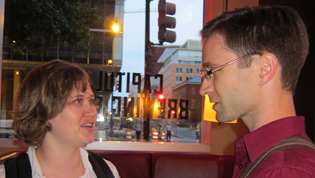The Training Page
SPECIAL ESSAYS
Keep the Thread: Balancing Family with Your Science Career
For many of us, responsibilities for child rearing and other family requirements fall exactly at the time when our scientific careers are taking off. This puts many postdocs in a quandary: Should we postpone having children until after we obtain a secure position, take a break from our careers to attend to family responsibilities, or attempt to balance these equally urgent requirements?
In an effort to alleviate some of the challenges for postdocs with family responsibilities and to help retain fellows who might otherwise drop out of science, the Committee on the Intramural Research Program of the NIH Working Group on Women in Biomedical Careers has been exploring re-entry and accommodation options. As a result, the “Keep the Thread” pilot program has just been launched. This program will offer postdocs several options for increasing flexibility, temporarily reducing hours, and staying connected to their research and the NIH community.
Individual circumstances may vary, and specific arrangements must be mutually agreed upon by the fellow, the principal investigator (PI), and their scientific director (SD). Accommodations may include telework, flexible scheduling, and temporary reduction in hours to part-time status. The agreement also includes a re-entry plan that specifies when the fellow plans to return to full-time research and how the PI will fill the position in the meantime.
“Keep the Thread” will be open to female and male NIH postdoctoral fellows (but not visiting fellows because of visa restrictions) who have been at the NIH for at least six months and have an established research project. These policies may be implemented upon returning from parental leave (Intramural Research Training Award fellows are entitled to eight weeks of paid leave after the birth or adoption of a child) or when faced with family situations not covered by the NIH parental-leave policy. At the end of the three-year trial period, “Keep the Thread” will be evaluated to determine whether the program meets the needs of NIH fellows, PIs, and SDs.
In a nutshell, “Keep the Thread” is intended to clarify intramural family-friendly policies, publicize their availability, encourage PIs to work with their fellows to establish a plan, and reduce the stigma often associated with accepting accommodations. Although the pilot program is largely composed of family-friendly policies already in existence at NIH, some policies have been enhanced to facilitate re-entry into full-time research.
Balancing research with family will always be difficult, but “Keep the Thread” will help postdocs navigate this challenging yet rewarding time of their lives.
To find out more about this initiative go to http://sourcebook.od.nih.gov/prof-desig/Keep_the_Thread_2012.docx.
Speed Networking for Scientists
Your heart pounds. Your palms sweat and become clammy. Your mind goes blank. All because someone asked, “So, what about you?”
It’s time to describe your work, in two minutes or less, without visual aids, to a fellow scientist in a different discipline.

Sarah Naylor is practicing speed networking with Ben Porter.
Welcome to speed networking for scientists. It’s like speed dating only you’re not looking for a romantic companion. In the last several years, speed networking has become a popular way to meet informally and even find potential collaborators. Recently, a group in Germany offered to fund collaborations that originated from speed-networking interactions.
My speed-networking experience took place in August 2012 at a meeting of the Potomac Chapter of the Society for Neuroscience (SFN). The encounters generated discussions about research, interests outside the lab, and hints for improving these two-minute pitches. As a new postdoctoral fellow at NIMH, I worked out the kinks in my brand new pitch about my research on neural circuits that govern innate behaviors.
One of the people I met via speed networking was NINDS postdoctoral fellow Ben Porter, who recently reactivated the Potomac Chapter (renamed the Washington D.C. Metro Area Chapter), which had closed a few years ago. He thought a speed-networking event would make for a good first meeting and be a great way for the chapter members—scientists from NIH and nearby universities and companies as well as others with an interest in neuroscience—to get acquainted. And who knows, maybe some of us will decide to collaborate, too.
To learn more about the local SFN chapter, contact Ben Porter (porterba@mail.nih.gov or 301-594-0365). Events are held monthly in the D.C. metro area, including on the NIH campus., and range from professional networking and development, to volunteering, to discussions of neuroscience, to giving practice presentations about your job, research, or skills.
This page was last updated on Friday, April 29, 2022
